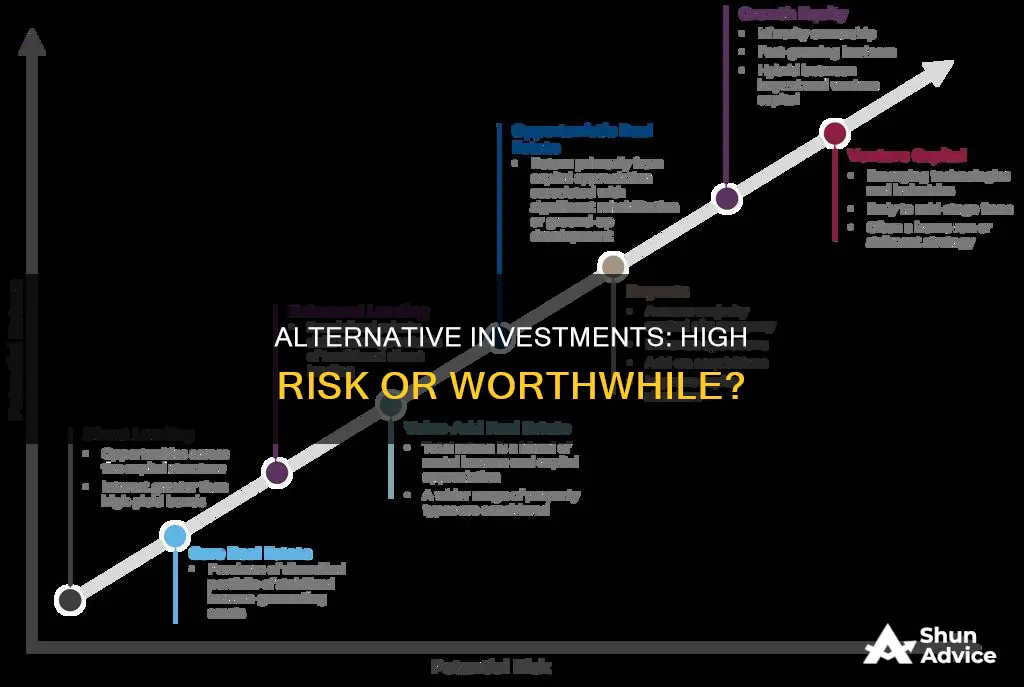
Alternative investments are financial assets that do not fall into conventional investment categories such as stocks, bonds, and cash. They include private equity, venture capital, hedge funds, real estate, commodities, and cryptocurrencies. These investments are typically complex, illiquid, and carry higher fees and risks than traditional investments. However, they can provide portfolio diversification, enhanced returns, and access to broader opportunities. The key risks associated with alternative investments include economic growth sensitivity, inflation sensitivity, interest rate sensitivity, project-specific development risk, finance/leverage sensitivity, illiquidity, and regulatory uncertainty. Understanding these risks is crucial for investors considering alternative investments.
| Characteristics | Values |
|---|---|
| Returns | The rate of return is not guaranteed but may be higher than traditional investments |
| Complexity | More complex than traditional investments |
| Fees | Often have higher fees |
| Risk | Higher risk than traditional investments |
| Regulation | Less regulated than traditional investments |
| Liquidity | Often less liquid than traditional investments |
| Volatility | More volatile than traditional investments |
| Accessibility | Often only available to institutional or accredited investors |
| Transparency | Often lack transparency |
What You'll Learn

Alternative investments are complex and risky
One of the main complexities and risks associated with alternative investments is their illiquidity. Illiquid assets are challenging to sell or exchange for cash quickly and may result in a substantial loss in value. For example, an investor may find it difficult to sell an 80-year-old bottle of wine compared to selling 1,000 shares of a publicly traded company like Apple Inc. due to a limited number of buyers for the wine. This lack of liquidity can also make it difficult to value alternative investments accurately, as the assets and transactions involving them are often rare.
Alternative investments are also complex due to their unique nature and differences from traditional markets. They have low correlations to traditional investments, making them attractive for portfolio diversification and risk reduction. However, this complexity increases the risk of making uninformed or inappropriate investment decisions. For example, some alternative investments have complex structures and terms that can be challenging for investors to understand.
Another risk factor is the potential for higher returns, which often comes with higher volatility and the possibility of significant losses. Leverage is commonly used in alternative investments to increase buying power and improve returns. While this can enhance returns, it also increases the potential for greater volatility and losses. If the value of a leveraged asset drops unexpectedly, an investor may be left holding an asset worth less than the leveraged amount, unable to repay their loan.
Additionally, alternative investments often have higher fees and expenses compared to traditional investments. Private equity and hedge funds, for instance, typically charge high management and performance fees, reducing investors' returns. The lack of regulation in alternative investments further adds to the risk, making them more prone to investment scams and fraud.
In conclusion, alternative investments are complex and risky due to their illiquidity, complexity, potential for higher returns and volatility, high fees, and lack of regulation. While they offer benefits such as portfolio diversification and enhanced returns, investors must carefully consider and understand these risks before investing in alternative assets.
Twitch's Bad Investment: What Went Wrong?
You may want to see also

They are often illiquid and difficult to value
Liquidity and valuation are two key considerations when assessing the risk of an investment. Alternative investments are generally considered to be less liquid than traditional investments, and can be difficult to value accurately.
Liquidity refers to how easily or quickly an investor can sell shares or interests in an investment. Alternative investments are often illiquid, meaning they cannot be sold for an extended period without a significant impact on price. This can be due to a lack of ready and willing investors to purchase, lower trading volumes, and greater price volatility. The more illiquid an asset is, the harder it is to sell without incurring a substantial loss in value.
For example, an investor is likely to find it much more difficult to sell an 80-year-old bottle of wine compared to 1,000 shares of Apple stock due to a limited number of buyers for the wine. This limited market for alternative investments can also make it challenging to obtain market data on historical trends or pricing.
Valuing alternative investments can also be difficult, as the assets and transactions involving them are often rare. For instance, a seller of a rare gold coin may struggle to determine its value due to the small number of comparable assets available.
Unlisted or non-publicly traded investments pose additional challenges for valuation. Unlike publicly traded equities, which are regularly reviewed by financial analysts, there is no clear source of "truth" for determining the value of unlisted assets. Auditors must consider various factors, including market conditions, risk exposure, capital structure, liquidity levels, and volatility, when assessing the fair value of these investments.
The illiquidity and complex valuation of alternative investments can make it challenging for investors to exit their positions quickly or accurately assess the worth of their holdings. These factors contribute to the higher risk associated with alternative investments compared to traditional investment options.
Equity Investments: Do They Cost Money?
You may want to see also

They are prone to scams and fraud
Alternative investments are prone to scams and fraud due to the lack of regulations. They are often subject to a less clear legal structure than conventional investments.
Alternative investments are not overseen or regulated by the SEC as they usually don't have to register with them. This means that investors must conduct extensive due diligence when considering alternative investments. In some cases, only accredited investors—those with a net worth exceeding $1 million or with a high annual income—may invest in alternative offerings.
The lack of regulation and complex nature of alternative investments make them more susceptible to scams and fraud. For example, some alternative investments may not be commonly publicly traded, making it more difficult to obtain market data on historical trends or pricing. This opacity can make it easier for unscrupulous individuals to manipulate prices or engage in fraudulent activities without detection.
Additionally, alternative investments often involve unique items like coins, art, or collectibles, which can be challenging to value accurately. This lack of standardised valuation methods can create opportunities for fraud or misrepresentation of the true value of the investment.
Furthermore, alternative investments may be subject to less regulatory oversight, increasing the risk of fraud, misconduct, and other abuses. The combination of limited regulatory oversight and complex structures creates an environment where scams and fraud may go unnoticed or be challenging to identify.
It is important for investors to thoroughly research and understand the risks associated with alternative investments to make informed decisions and protect themselves from potential scams and fraudulent activities.
State Investment Fuels China and India's Rapid Growth
You may want to see also

They have higher fees and expenses
Alternative investments are financial assets that do not fall into conventional investment categories such as stocks, bonds, and cash. They include private equity, venture capital, hedge funds, real estate, commodities, and tangible assets. These investments are often complex and carry higher fees and expenses compared to traditional investments. Here are some key points to consider:
Higher Management and Performance Fees
Private equity and hedge funds typically charge substantial management and performance fees, which can significantly reduce investors' returns. For example, private equity and hedge fund managers usually collect a percentage of the profits generated by the fund, known as carried interest, in addition to a fixed management fee. These fees can be substantial and impact the overall profitability of the investment.
Illiquidity and Transaction Costs
Alternative investments are generally less liquid than traditional investments, making it challenging to sell them quickly. This illiquidity can result in higher transaction costs and a potential loss of value. For instance, selling an 80-year-old bottle of wine is likely to be more difficult and incur higher costs compared to selling shares of a publicly traded company.
Complex Structures and Terms
Some alternative investments have intricate structures and terms that can be challenging for investors to understand. This complexity increases the risk of investors making uninformed or inappropriate decisions. For example, certain alternative investments may involve leveraging, where money is borrowed to fund purchases, increasing the potential for returns but also heightening the risk of losses.
Higher Minimum Investments
Many alternative investments have high minimum investment requirements, making them more accessible to institutional investors or high-net-worth individuals. These high minimums can be a barrier for smaller investors, limiting their access to certain alternative investment opportunities.
Limited Regulatory Oversight
Alternative investments often have fewer regulations and are not required to register with the U.S. Securities and Exchange Commission (SEC). This reduced regulatory oversight can increase the risk of fraud, misconduct, and other abuses. Therefore, investors must conduct extensive due diligence when considering alternative investments.
In summary, alternative investments often carry higher fees and expenses compared to traditional investments due to management and performance fees, illiquidity, complex structures, high minimum investments, and limited regulatory oversight. These factors are essential to consider when evaluating the potential risks and returns of alternative investments.
British Plantations in India: A Historical Investment Decision
You may want to see also

They are less regulated
Alternative investments are financial assets that do not fall into conventional investment categories such as stocks, bonds, and cash. They include private equity, venture capital, hedge funds, real estate, commodities, and tangible assets. These types of investments are often less regulated than traditional investments, which can impact their level of risk.
In the United States, alternative investments are regulated by the Dodd-Frank Wall Street Reform and Consumer Protection Act and are subject to examination by the Securities and Exchange Commission (SEC). However, they are generally not required to register with the SEC and are therefore not overseen or regulated by the commission in the same way that mutual funds and exchange-traded funds (ETFs) are. This lack of oversight means that alternative investments are more prone to investment scams and fraud.
The lack of regulation also means that alternative investments often have less opportunity to publish verifiable performance data and advertise to potential investors. This can make it challenging for investors to conduct thorough due diligence before investing. In some cases, only accredited investors—those with a high net worth or income—are permitted to invest in alternative offerings due to the complex nature and higher risk of these investments.
Alternative investments also tend to be less liquid than traditional investments, meaning they can be difficult to sell quickly without incurring significant losses. This illiquidity is another factor that can increase the risk associated with alternative investments.
Additionally, the valuation of alternative investments can be challenging due to their unique nature. Unlisted assets may not have a clear source of "truth" for their value, and even finding prices of comparable assets can be difficult. This lack of transparency can further increase the risk for investors.
While alternative investments offer potential benefits such as diversification and enhanced returns, it is important for investors to carefully consider the risks associated with these less-regulated investment options. Conducting thorough research, understanding the complex structures and terms, and seeking advice from financial professionals are crucial steps before investing in alternative assets.
Understanding Managed Portfolio Investment Strategies and Benefits
You may want to see also







